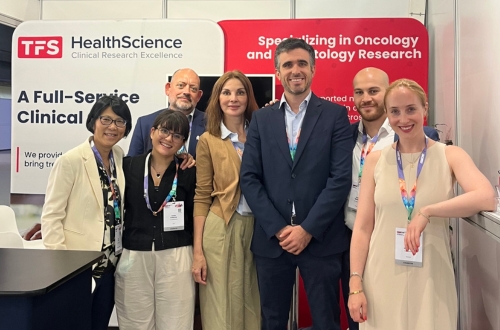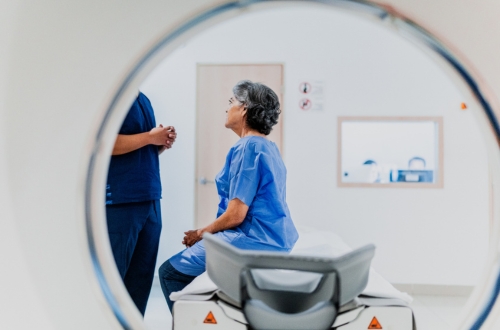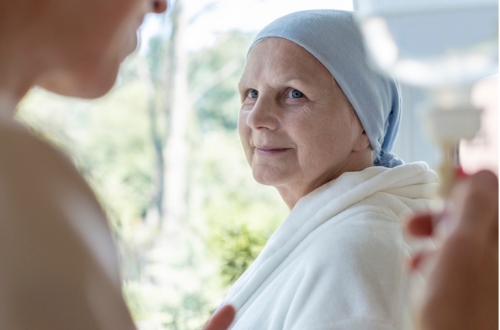Future Trends in Oncology: Insights from ESMO 2024
In 2022, the International Agency for Research on Cancer (IARC) reported nearly one in five men or women develop cancer in a lifetime, whereas around one in nine men and one in 12 women die from it. Fast forward to 2024, the American Cancer Society projects there will be 2,001,140 new cancer cases and 611,720 cancer deaths across the United States (U.S.) alone. These numbers emphasize the persisting global burden of cancer as a leading cause of death around the world year after year. Recognizing these trends, the European Society for Medical Oncology (ESMO) holds an annual meeting to bring awareness to groundbreaking research in oncology that is set to shape the future of cancer care.
This year, over 34,000 participants, nearly 600 speakers from 149 countries gathered at the ESMO 2024 Congress in Barcelona, Spain from September 13-17. From posters and sessions to mini orals and late-breaking abstracts, this meeting is a pivotal event in the oncology calendar each year, bringing together the world’s leading experts, researchers, and healthcare professionals to share the latest advancements in oncology. As a leading CRO (Contract Research Organization) in oncology clinical trials, TFS HealthScience’s seasoned Oncology and Hematology team were among the experts participating at ESMO 2024. Using the wealth of data presented and discussed at the conference, this article will highlight key insights and present the top five therapeutic trends that emerged from ESMO 2024.
Continue reading to discover which cutting-edge therapies and innovations are shaping the future of oncology clinical trials!
1. Advancements in Immunotherapy for Oncology Care
This year’s ESMO Congress saw several leaps forward in immunotherapy clinical trials for a variety of cancers, including breast cancer, melanoma, and more. According to the National Cancer Institute (NCI), immunotherapy is a type of cancer treatment that enlists the help of a patient’s own immune cells to fight tumors and malignancies. Although this type of treatment is by no means new to oncology clinicians, the field has seen rapid developments expanding the types of available options, which now span immune checkpoint inhibitors (ICIs), T-cell transfer therapy, monoclonal antibodies, immune system modulators, and even cancer treatment vaccines.
ESMO 2024 Congress Spotlights on Immunotherapy in Oncology
Several studies presented at ESMO 2024 demonstrated promising immunotherapy trial readouts for treating cancers that have traditionally been resistant to this approach.
First-line immunotherapy combination improves overall survival in HER2-positive metastatic G/GEJ adenocarcinoma
Results from the KEYNOTE-811 clinical trial showed significant overall survival (OS) benefit when treating patients with treatment-naïve unresectable, HER2-positive metastatic gastric/gastro-esophageal junction (G/GEJ) adenocarcinoma with pembrolizumab plus trastuzumab and chemotherapy. Relative to placebo plus trastuzumab and chemotherapy, first-line pembrolizumab was associated with a greater median OS of 20 months (vs. 16.8 months in the placebo group) and longer progression-free survival (PFS) at 10 months (vs. 8.1 months in the placebo group). Read the full article here.
Long-term survival benefits reported with neoadjuvant immunotherapy combinations in stage III melanoma
Results from the International Neoadjuvant Melanoma Consortium (INMC) also presented long-term outcomes in patients with resectable stage ≥IIIB melanoma treated with immunotherapy. In the survival updates presented after a median follow-up time of three years, event-free survival (EFS) ranged from 77% to 81% when combining anti-PD-1 (programmed death-1) therapy with either anti-LAG3 (lymphocyte-activation gene 4) or anti-CTLA-4 agents, respectively. In contrast, EFS was 64% in those who received anti-PD-1 therapy alone. Patients who were treated with an ICI demonstrated the highest 3-year relapse-free survival (RFS) rate at 89% in this study. Read the full article here.
2. Targeted Therapies and Antibody-Drug Conjugates
Targeted therapies like antibody-drug conjugates (ADCs) were another popular topic of discussion at ESMO 2024, which was not surprising considering nearly 25% of all pharmaceutical merger and acquisition deals in 2023 involved these drugs. An ADC is a sophisticated agent that combines the targeting ability of monoclonal antibodies with potent cytotoxic chemotherapy drugs that can be delivered directly inside the tumor cells, sparing healthy cells.
ESMO 2024 Congress Spotlights on Antibody-Drug Conjugates in Oncology
Because the application of ADCs in cancer care is still in its early stages, today’s clinical trials are mostly focused on determining their safety and feasibility of this strategy. However, the field of oncology is seeing an expansion of new research into identifying new molecular targets and linker technology to create more effective ADCs. Based on this trend, we can expect to see the full clinical impact of these drugs on patients with cancer in the coming years.
AbbVie’s ADC pipeline: Updated developments for high-unmet-need tumor types
AbbVie has had a long-standing ADC development pipeline in the field of oncology and their updates were presented at ESMO 2024 for three drugs: mirvetuximab soravtansine, Teliso-V, and ABBV-400. When treating alpha-positive, platinum-sensitive ovarian cancer, mirvetuximab soravtansine, which targets the folate receptor, demonstrated an objective response rate (ORR) of 51.9% with a tolerable safety profile.
On the other hand, Teliso-V and ABBV-400 are ADCs that target tumors overexpressing c-Met, such as in non-small cell lung cancer (NSCLC). ABBV-400 has been demonstrating promise against NSCLC and gastroesophageal cancers, but it is still pending further research. In contrast, AbbVie plans to leverage Teliso-V’s demonstrated efficacy against NSCLC and submit an accelerated approval application in Q3 2024, with a review by the U.S. Food and Drug Administration (FDA) expected in 2025.
Claudin-targeted antibody–drug conjugates are promising treatments for solid tumors
Three Phase I trials were presented at ESMO 2024, demonstrating the potential of using novel ADCs that target claudin proteins in patients with advanced solid tumors. Claudins are transmembrane proteins that serve to maintain tight cell junctions between cell membranes. In one dose-escalation study (Abstract 610O), the claudin-directed ADC demonstrated no dose-limiting toxicities and no observed neutropenia (a common side effect of other ADCs). Two other claudin-targeting ADCs in early-phase trials also demonstrated efficacy in 73 patients with gastric or gastroesophageal junction cancer (Abstract 609O) and in 16 patients with locally advanced and/or solid tumors (Abstract 651P). Gastrointestinal tumors traditionally have poor prognosis, highlighting the potential of treating them with ADCs, especially in future expansion studies. Read the full article here.
3. Artificial Intelligence (AI) in Oncology Treatments and Clinical Trials
It’s no secret that AI and machine learning are rapidly revolutionizing several aspects of oncology disease management, from diagnosis and treatment planning to drug discovery and clinical trial design. To date, researchers and leading CROs in cancer research have come out with multiple approaches for incorporating AI-based digital tools when caring for patients. These approaches involve conducting predictive analysis using models trained by large-scale patient health record datasets, leveraging AI insights to assist in clinical decision-making, the growing use of autonomous robotics in surgery, and remotely monitoring patient health through wearables.
ESMO 2024 Congress Spotlights on Artificial Intelligence in Oncology
There were a variety of presentations at the congress demonstrating how AI algorithms can analyze complex medical imaging data to detect cancers earlier and with greater accuracy than traditional methods. For example, a key abstract presented during the dedicated Presidential Symposium spotlighted the potential of GigaPath, an AI foundation model meant for cancer mutation prediction and tumor microenvironment analysis. Even ESMO President, Dr. Andrés Cervantes, highlighted the importance of using AI to analyze medical images from both radiology devices and pathology slides. Because computers are able to capture information faster and on a larger-scale than the human eye, AI-based imaging tools can facilitate better diagnosis, treatment and follow-up in patients with cancer.
Recognizing the growing number of opportunities like these for AI applications in oncology, ESMO announced its plans to host the first ESMO Artificial Intelligence and Digital Oncology Congress in Berlin in November 2025, allowing oncology experts to discuss how to validate AI tools, implementing AI for optimal clinical trial designs, and establishing expected standards and outputs.
4. Precision Medicine and Genomic Profiling in Oncology Care
According to the American Cancer Society, precision medicine is an approach, also known as personalized medicine or personalized care, that allows physicians to create a treatment plan based on a patient’s unique set of genes, proteins, and disease characteristics. This method is especially tied closely to advances in immunotherapies and targeted therapies like ADCs, which are designed to target specific molecules and cancer types.
ESMO 2024 Congress Spotlights on Precision Medicine in Oncology
Precision oncology continues to be a dominant theme in conferences like ESMO 2024, with several presentations speaking on the use of genomic profiling and other molecular diagnostic techniques to tailor emerging cancer treatments.
Predictive biomarkers in NSCLC by AstraZeneca
The Phase III TROPION-Lung01 trial used AstraZeneca’s quantitative continuous scoring (QCS) platform to measure tumor cell TROP2 protein expression in patients with NSCLC. The results of the trial reported that TROP2-QCS-positive patients experienced a 43% reduction in risk of disease progression or death when treated with datopotamab deruxtecan (PFS: 6.9 months) versus docetaxel (PFS: 4.1 months). These findings support TROP2 as a potential predictive biomarker to identify patients who can benefit from specific cancer ADCs and immunotherapies. Read the press release here.
ESMO 2024 highlights the importance of integrating comprehensive genomic profiling into oncology clinical practice
The ROME trial, a randomized multi-basket Phase II study presented at the ESMO 2024 Presidential Symposium, showed evidence for the benefits of incorporating genomic profiling into personalized cancer treatments. In 400 pre-treated patients with advanced or metastatic solid tumors across 38 different histologies, targeted therapy was associated with significantly improved ORR (17.5% vs. 9.5%, P = 0.027) and PFS (3.7 months vs. 2.8 months, P <0.0001) compared to the standard-of-care treatment. Another prospective open-label trial, FINPROVE, found that patients who received treatment recommendations based on DNA profiling experienced longer PFS durations. These and other similar abstracts presented at ESMO 2024 underscored the improvements offered by using comprehensive genomic profiling (CGP) to determine personalized oncology care. Read the full article here.
5. Preventing Burnout Among Oncology Healthcare Professionals
To end off, ESMO 2024 also emphasized an often-overlooked aspect of oncology care: burnout. This year’s congress brought attention to the need for strategies to reduce this level of job stress among the oncology workforce and retain more young professionals in the field to ensure its future. In a dedicated session, President Cervantes defined burnout as “a situation in which a professional feels overwhelmed by their responsibilities and is no longer able to cope with the difficulties of performing their day-to-day activities”.
The conference presented results from a series of ESMO surveys conducted on 4,000 physicians across 104 countries. The researchers found that 70% young doctors were presenting some symptoms relating to burnout at the time of the survey and over 33% were considering leaving the field entirely. No doubt burnout can have lasting off-shoot effects on a clinician’s mental health, causing anxiety, depression, and/or insomnia. Clinical oncology is one of the fastest evolving fields in medicine and its workforce must be well taken care of so that they can deliver proper care to future patients.
Dr. Cervantes proposed a three-pronged approach to addressing burnout among the profession: providing support to help oncology clinicians cope with the problems they face, creating a healthier open working environment at the institutional level, and encouraging professional societies to raise awareness about the dangers of burnout. To model the third prong, the ESMO Resilience Task Force recently released its recommendations for managing psychosocial risks and optimizing worker well-being in this multi-tiered strategy proposal here.
Conclusion
To conclude, the ESMO 2024 Congress was a pivotal event in this year’s oncology calendar, with thousands of participants congregating to showcase significant therapeutic advancements, from immunotherapy to novel ADCs. Precision medicine and CGP for tailoring treatment approaches in cancer care also emerged as important trends to watch for in the coming years. Aside from medical research advances, ESMO placed a dedicated emphasis on addressing the critical issue of burnout among healthcare professionals in oncology. Altogether, these insights demonstrate how quickly the field of oncology is developing and the proportional need for supporting its workforce, with key trends delivering more new treatment options for patients with high-unmet-need cancers. Although they may present some initial challenges, these top five trends are shaping the future of oncology and we can expect to see even more innovations emerge in this therapeutic area in the coming years.
TFS: Your Oncology CRO Partner
TFS HealthScience Oncology and Hematology CRO is dedicated to providing comprehensive services to support your oncology clinical trials. With a proven track record of over 300 cancer-related clinical trials across all phases, we’re committed to delivering solutions that match your needs. Our global operations teams are fully experienced with navigating the complex landscape of cancer clinical research, offering rigorous operational oversight and adherence to global standards under the strong leadership of Kris O’Brien, VP, Head of Oncology & Rare Diseases. Visit our oncology CRO website to learn more or connect with a TFS representative here!
Interested in more Oncology and Hematology CRO content from TFS? Visit our Intellect Hub here to access white papers, articles, case studies, and more!
Connect with Us
Contact us today to discover how TFS can be your strategic CRO partner in clinical development.



